W4 is proud to support the wonderful, vital programs of the grassroots organization Birthing Project USA. Founded by Kathryn Hall-Trujillo, Birthing Project has been working for decades to reduce maternal and infant mortality in the US and abroad. Our editorial team sat down for a talk with the team’s International Medical Director, Dr. Sarpoma Sefa-Boakye, about Birthing Project’s passionate mission to save women’s and babies’ lives.
Maternal mortality remains a critical problem in the US, and it has worsened since the 1990s. As a physician, could you give us some insight into the kinds of pregnancy-related complications that continue to compromise women’s lives and well-being?
First, when we speak of maternal mortality in the United States, we have to speak about the disparities that exist between African-American women and white women. African-American women are 3 to 4 times more likely to die from pregnancy-related complications as white women.
Pregnancy-related death is when a woman dies during pregnancy or within one year after the end of her pregnancy from health problems related to the pregnancy. We can divide the causes of death into external and internal. External causes are mainly socio-demographic, environmental issues, including the kind of place where a woman lives if she is in poverty. Likewise, class: even if a woman is living in an area where there is access to healthcare, does she have access to healthcare?

The internal factors are mainly to do with a woman’s health status. Internal causes of death could be cardio-vascular, mainly heart disease, or hypertension, which can be either chronic or pregnancy-induced, leading to congestive heart failure. Pre-eclampsia and eclampsia are other specifically pregnancy- and birth-related illnesses that African-American women are at very high risk of developing. Diabetes is an obvious problem, as is gestational diabetes. Then there are the complications of labor and delivery. Maternal haemorrhaging can occur with either vaginal births or C-sections. Maternal infection can arise during an instrumented birth, if suction cups or forceps have to be used, for example. Finally, there are clotting disorders, which can occur during pregnancy or post-partum, with the greatest problem being pulmonary embolisms, which can cause sudden death.
There many medical problems to consider, but the primary thing to understand is that many of these women — especially African-American women, who are at especially high risk of pregnancy-related complications or death — have never accessed healthcare before becoming pregnant. In fact, in the United States, where many people have limited access to healthcare and may be uninsured or under-insured, so they don’t have insurance that will cover the cost of regular preventive or prenatal visits, there are too many women who do not access any health services at all until they suddenly have to go into the ER! As physicians, or any healthcare professionals who deal with pregnancy, we know that pre-conceptional health — a woman’s health status prior to the moment that she conceives, at least a year prior — will determine her health status throughout pregnancy. Imagine: you have never been to a doctor and your first time going is when you start showing signs of pregnancy, not even immediately after you conceive; then you start having issues, like high blood pressure, diabetes — this is when the bigger problems arise.
How does the Birthing Project help to address this problem?
The Birthing Project’s mission is to enhance birth outcomes, primarily for women of color. We have a two-pronged approach: in the United States, we use the “SisterFriends” project; and internationally we use the “SisterFriends” projects and the Birth Kits. (In countries outside the US, the main issue with maternal mortality and pregnancy-related death is access to sterile tools and supplies. Women die of infection, they die of haemorrhages, they die because they do not have the correct tools.)
A “Safe Birth Kit” containing essential medical supplies to ensure the safe delivery of babies
The SisterFriends project was created in the early 1980s in the living room of our founder, Mama Katt, who was working for the State of California and was in charge of a neonatology unit budget, tasked with trying to reduce the costs of rehabilitating babies who had been exposed to crack or any forms of heroin. Naturally, she focused mainly on prevention, and she found that a lot of the mothers of these babies had never been to a doctor until it was time to deliver! Of course, those women had the extra burden of drug addiction, but the biggest thing that Mama Katt found was that many of the mothers whose babies had to go into the neonatology unit were women who didn’t have any socio-economic support, didn’t have people to help them to access necessary health services.
Founder of Birthing Project USA Kathryn Hall-Trujillo (left) & SisterFriend program participants
So, she formed a group with her friends and decided that each woman was going to “SisterFriend”, i.e., mentor, another woman who was pregnant. This way, each mother-to-be (or “Little Sister”) would have someone who would remind her to go to her prenatal care appointments, remind her to eat, and eat well, be her confidante and someone to lean on. Each SisterFriend would support her Little Sister from the moment she discovered she was pregnant, through pregnancy and childbirth, and up until the baby was a year old. Just by doing this, among her friends and colleagues in the area where she lived, Mama Katt found that the situation was already improving. Of all the women involved in the SisterFriends program: not one of them had a pregnancy-related complication. It became clear that there are some preventative areas that you can focus on that will enhance women’s health outcomes.
The “SisterFriends” program is a central component of the Birthing Project. Could you describe the value of this approach?
Since its foundation, this project has done extremely well. We have many babies, children, and now adults, who have grown up through the SisterFriends program. For each group of 10 SisterFriends and 10 Little Sisters, we have one manager who oversees and guides them. The mentoring can be in person — a SisterFriend can go with her Little Sister to prenatal visits, etc., or it can be remote — they can talk on the phone and have communication and support that way. SisterFriends can also attend the baby’s delivery and support the mothers through childbirth.
SisterFriends are not health professionals, they are women in the community who are committed to mentoring. Some of them like to have more than one Little Sister, and often they continue, after that first year of the baby’s life, to be friends.
The SisterFriend approach is very effective. Studies have shown that support programs geared toward women in the prenatal period — anything that inspires a woman to make her appointments, enhances her ability to both get to her appointments and listen to the doctor’s recommendations during her appointments — will help to decrease both the internal and the external causes of pregnancy-related deaths. In addition, some of the more sheerly internal causes, such as hypertension or gestational diabetes, are reduced when the mother-to-be has someone helping to ensure that she attends her appointments and takes her medications.

The Birthing Project has been working successfully for more than 25 years. In the cities where we work — for example, in New Orleans and Detroit — all the studies show that the birth outcomes for women who have had SisterFriends are better than for those without SisterFriends.
Could you share with us how you came to be involved in the Birthing Project and your experience within the organization?
This is very close to home for me! When I was in medical school in Cuba, I came to know Mama Katt, who was instrumental in making sure that we medical students (not only female students, but also the males) received care packages. In Cuba, at that time, the embargo was very strict and receiving any aid from abroad was hard. Mama Katt would come to the island herself and give us care packages filled with helpful information, plus basic supplies, like books. I first met Mama Katt in 2002, and then in 2006, while I was still a medical student, I became pregnant and I really needed a SisterFriend! I was very stressed out, newly pregnant, going through a divorce, and also very busy studying. I took a year off medical school and worked as a health educator at the Birthing Project clinic in Sacramento, California. And I received not one, but three SisterFriends, who took care of me very well.
I then created a Birthing Project in Cuba, for the young mothers in medical school there. Also, after I had gone back and graduated from medical school in Cuba, I helped to create the International Birthing Project USA and we connected with other health professionals and with the organisation, AYZH, which produces the Birth Kits. Through that, I have been an international director since 2009. Now I’m a family medicine physician, based in San Diego, California. So, Mama Katt has helped mentor me all the way through, as a medical student, as a health educator, and now as a full-fledged doctor.
Birthing Project’s Health Program in Honduras which trains midwives
How can individuals support your work?
There are many ways to help. Donating is a great way. Many of the women who become SisterFriends are volunteering their time to help, so we just need to pay for their training. For us to manage 10 SisterFriends, the training is $2,500. So, one SisterFriend can help one Little Sister throughout her pregnancy and for the first year of her baby’s life, after a training that costs $250. Another way to donate is to pay for Birth Kits. For about the price of an espresso drink these days, i.e., $5, you can supply a Birth Kit, which includes sterile gloves, cord clamp, surgical blade, plus soap and a mat that the mother can lie on.
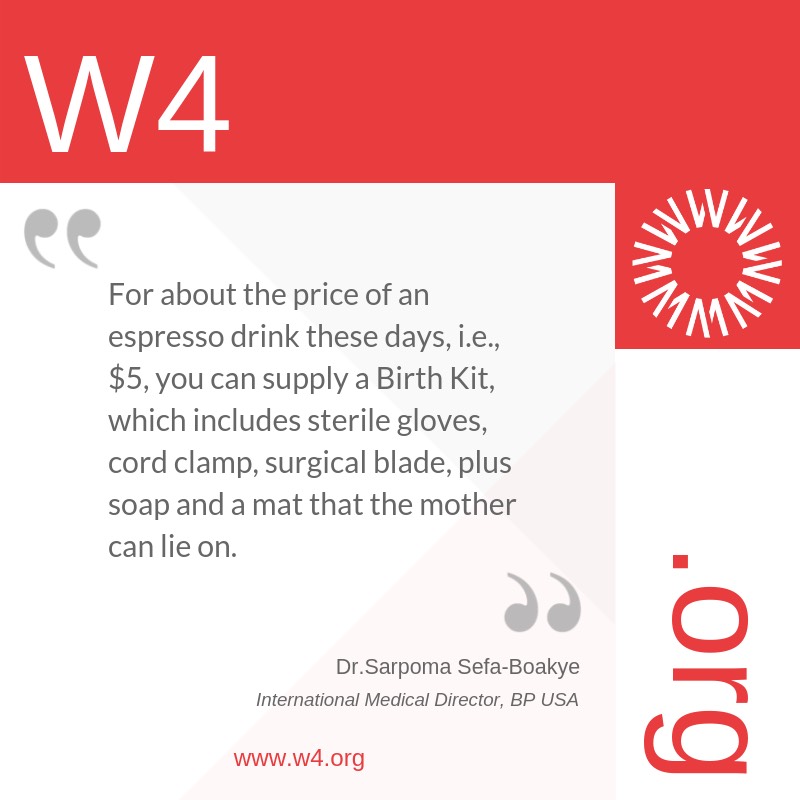
You mentioned that SisterFriends don’t need to be health professionals. Do they need to have experience with giving birth and having children already? What kind of criteria do you require?
You don’t have to be a health professional, you don’t even have to have children, you just need to: 1) have a passion for helping a woman who is in need during her pregnancy, and 2) be someone who has the time to be committed. We do a background check, of course, but often the people who become SisterFriends are women who are already volunteering through their jobs, their church, their women’s group. Sometimes the SisterFriend project is an extension of something they are already committed to, such as their book club. We make sure that this is a safe environment, vetting people and ensuring that they are equipped to do this.
Would you like to add anything else?
We would really like to thank W4 for all the work you have been doing to help us, and for offering us a platform to receive donations. It’s a combined effort: you’re SisterFriending us; and we’re SisterFriending each other in this process of delivering healthier birth outcomes.
Birthing Project USA Health Leaders
Find out more about Birthing Project and how you can get involved and support this project here.
W4 supports innovative grassroots projects that are driving real, positive change for girls and women— and their families and the wider community.
We’re proud to say that 100% of all individual donations, i.e. every cent, is used to fund our grassroots programs.









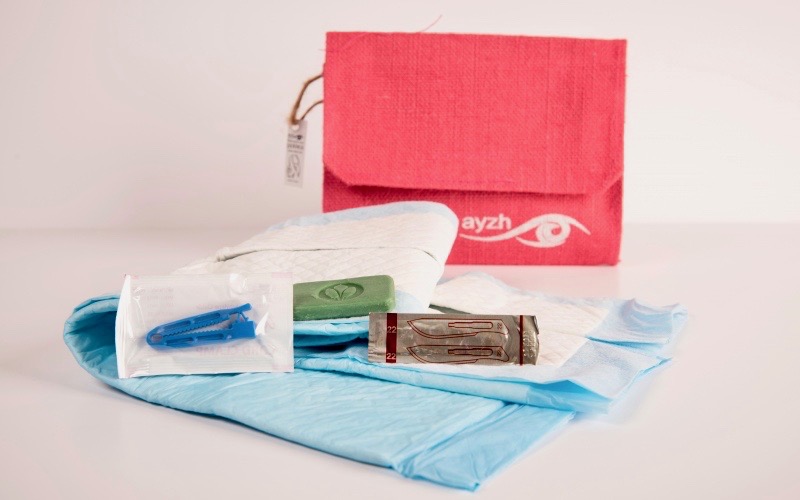
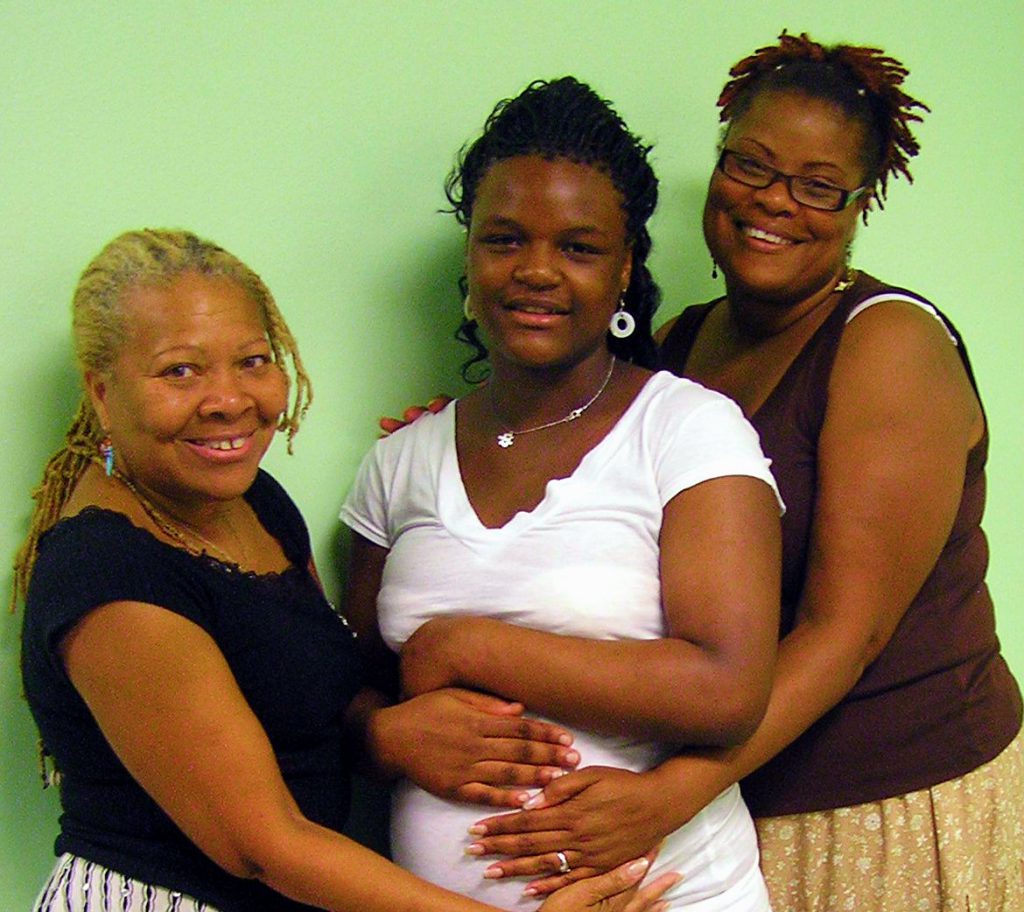
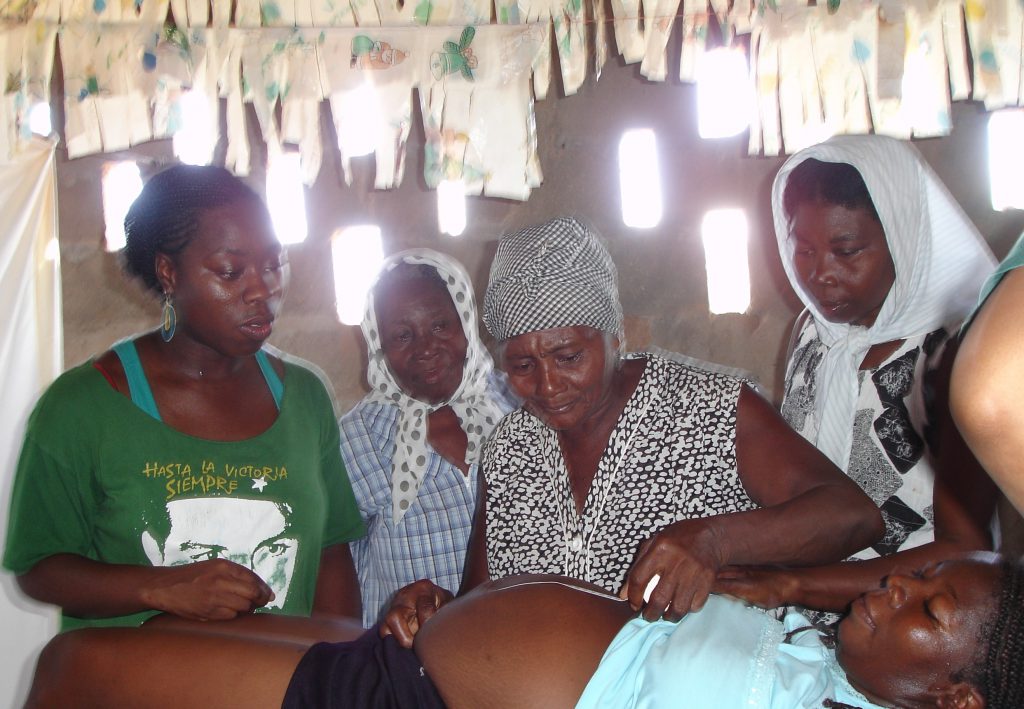
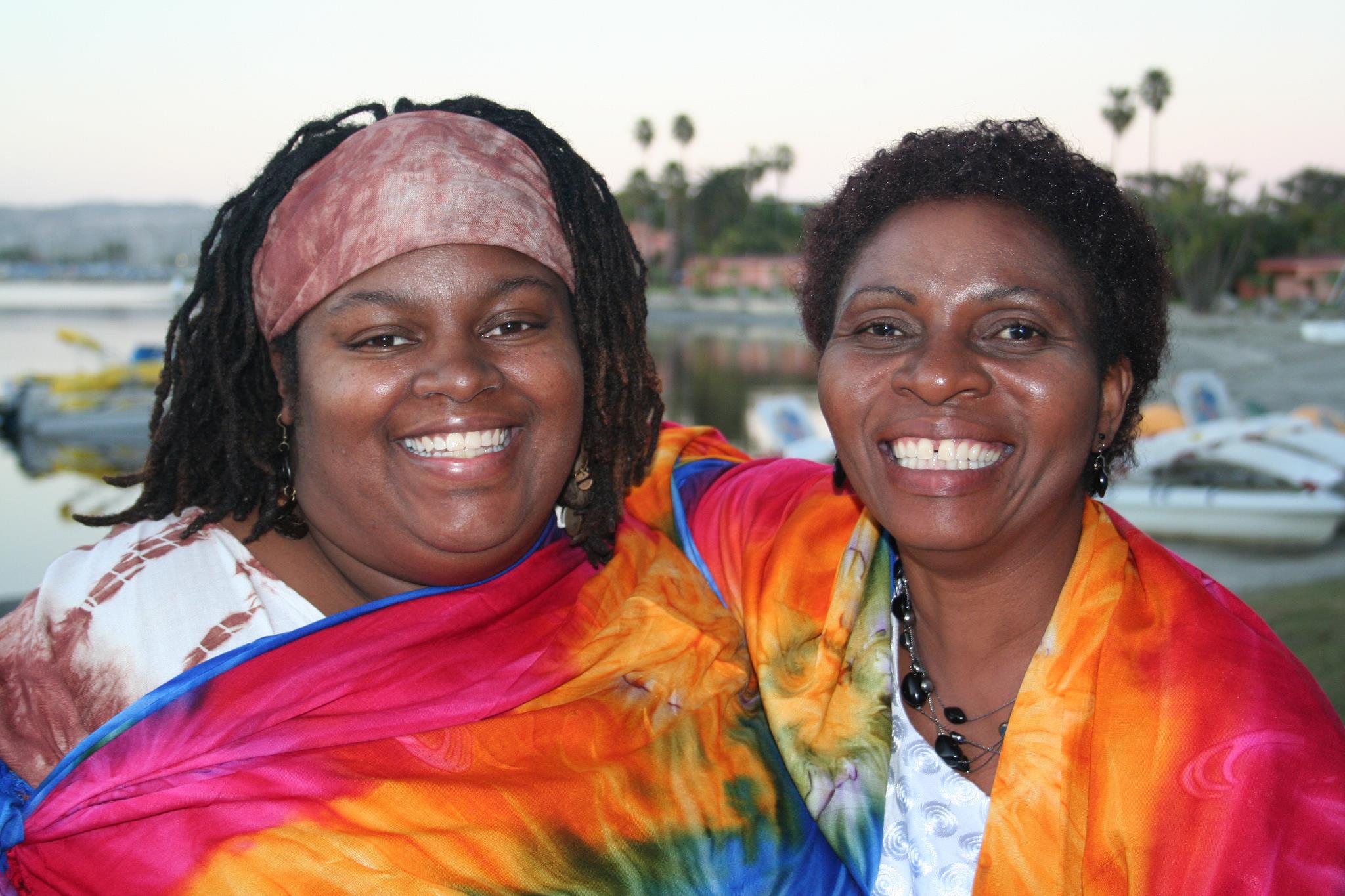





1 Comment
Hola,
I,m Dr.Muchiri
A kenyan doctor of human medicine but currently undertaking my post graduate training in MGI at the university of medical sciences of Havana.Back home I have worked in the department of obstetrics and gynaecology for up to 8 years.
Thus I,m well versed with what goes on the female reproductive systems both in pregnant and non pregnant states.
I would like to be part of this great team.
Where I can share my experience and join in solucion search.
Adios
Henry